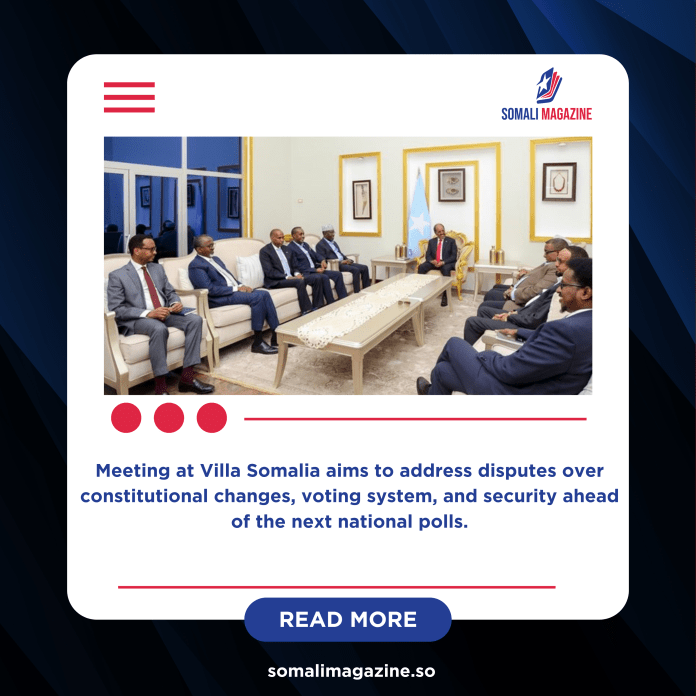Facebook Twitter (X) Instagram Somali Magazine - People's Magazine
Somali President Hassan Sheikh Mohamud is set to meet opposition leaders at Villa Somalia on Sunday for important discussions on the country’s political future. The talks will focus on resolving disagreements over recent changes to the constitution and preparations for Somalia’s next national elections in 2026.
The meeting comes after weeks of tension between the government and opposition groups over amendments to the Transitional Constitution. Opposition leaders have accused the government of making changes without broad consultation. They say this undermines trust in the political process and could create more divisions at a time when unity is crucial.
One of the most debated issues is Chapter 4 of the constitution. This section deals with the structure of Somalia’s political system and the way leaders are chosen.
Disagreement Over the Voting System
The government wants to introduce a nationwide “one-person, one-vote” system for the 2026 elections. This would allow every Somali citizen to vote directly for their leaders, replacing the current indirect system where clan delegates choose members of parliament.
President Hassan Sheikh argues that this change would strengthen democracy, give ordinary citizens more say in governance, and reduce the influence of clan-based politics.
However, opposition leaders believe the country is not yet ready for such a system. They argue that Somalia must first improve its security situation, particularly in areas still under the threat of al-Shabaab militants. They also insist that any major changes to the electoral process must be made through consensus, involving all political stakeholders, rather than being decided by the government alone.
The Role of Security in Political Reforms
Security remains one of Somalia’s biggest challenges. Large parts of the country, especially in the south and central regions, are still affected by attacks from the al-Shabaab group. Opposition leaders say it would be unsafe and impractical to hold direct nationwide elections under the current circumstances.
President Hassan Sheikh has acknowledged these concerns and emphasized the importance of uniting against terrorism. He has called on all political groups to work together to defeat al-Shabaab and create a safe environment for free and fair elections.
A Step Toward Political Stability
While Sunday’s meeting is unlikely to produce a final agreement, both sides see it as an important opportunity to rebuild trust and open channels of communication. The president has signaled that he is willing to compromise in order to reach a negotiated electoral roadmap.
Analysts say this dialogue could help ease political tensions and create a more cooperative environment ahead of the 2026 vote. Without such cooperation, Somalia risks facing more political instability, which could slow down progress on security, governance, and development.
The talks will also be watched closely by Somalia’s international partners, who have been encouraging political dialogue and supporting efforts to strengthen democratic institutions. Many foreign donors believe that a stable political agreement is necessary for Somalia to continue receiving aid and support for its security forces.
Looking Ahead
If the talks succeed, they could pave the way for a more inclusive decision-making process on the country’s constitutional reforms. A roadmap agreed upon by both the government and opposition could help ensure that the 2026 elections are both credible and widely accepted.
For now, the focus will be on whether the meeting at Villa Somalia can bridge the gap between the government’s push for direct elections and the opposition’s call for more security and consensus.
Regardless of the outcome, the fact that both sides are willing to meet and discuss their differences is seen as a positive step. In a country that has experienced decades of conflict, even small steps toward dialogue and cooperation are considered important victories.

